Archives
-

Medievalista 38 - Dossier "Ecclesiastical fiscality"
No. 38 (2025)Traz esta Medievalista outro dossier temático, coordenado por três editores convidados — Amandine Le Roux, Esther Tello Hernámdez e Mário Farelo — e dedicado à fiscalidade eclesiástica, uma área de estudos de afirmação mais recente. Com uma geografia sobretudo meridional, da Península à Sicília e a Roma, trata-se nele a fiscalidade apostólica, melhor conhecida, sem esquecer a utilização das rendas da Igreja em benefício dos poderes régios, ou mesmo senhoriais, no caso da dízima. Importa destacar a atenção aos agentes fiscais e aos livros de registo e de contabilidade, e, sobretudo, a história muito lenta dos dispositivos fiscais, sempre sujeitos a resistências de vária ordem e a uma negociação contínua entre todas as partes envolvidas. Tem este número outros motivos de interesse, em particular os artigos em destaque de Hilário Franco Júnior e de Arsénio Dacosta, um sobre as concepções medievais do espaço e do tempo, o outro sobre as geografias imaginárias da cultura letrada da nobreza peninsular.
-
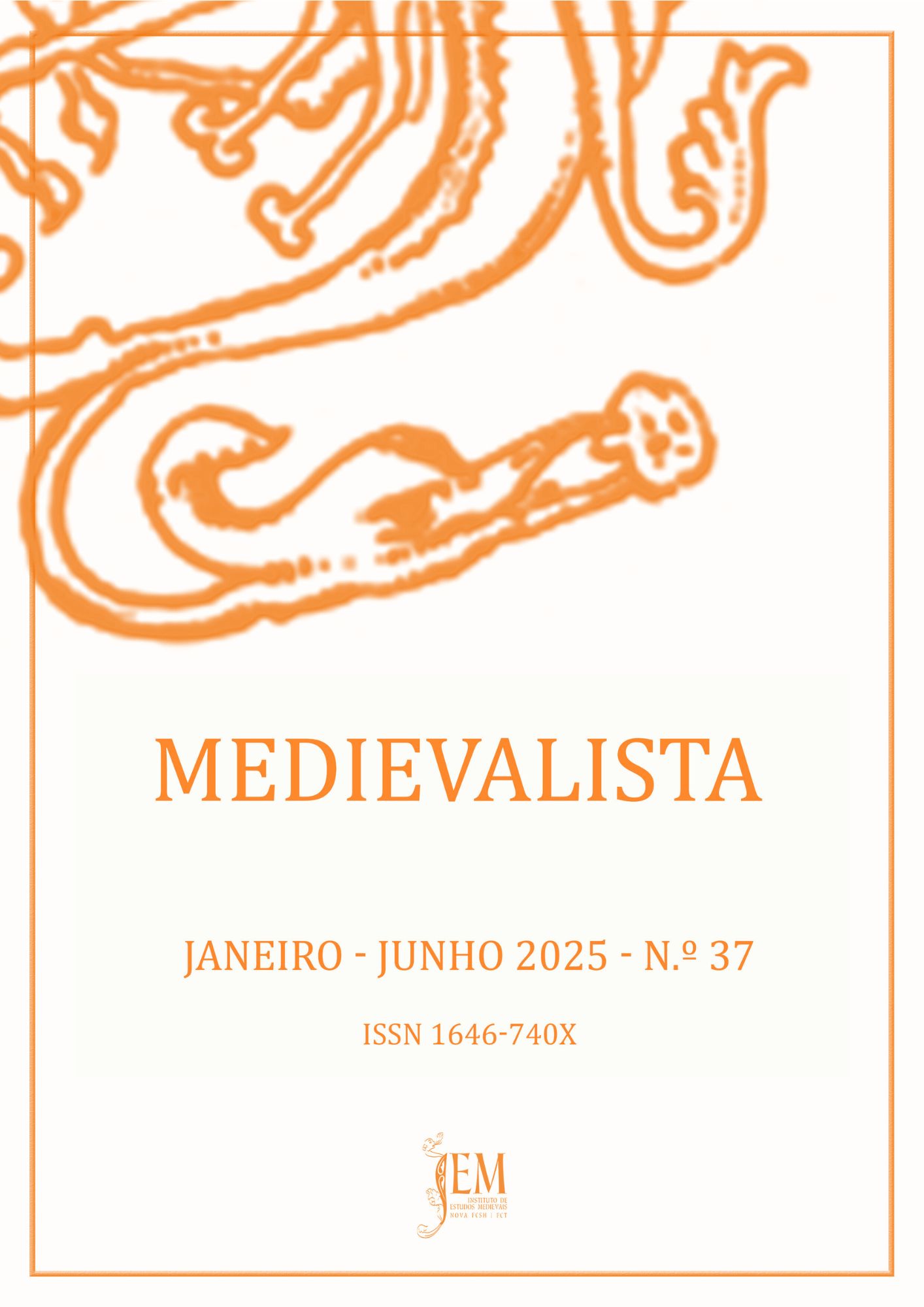
Medievalista 37 - Dossier "What survives after death? Parish Communities and Death Commemoration Strategies in the Medieval City – In memoriam Clive Burgess"
No. 37 (2025)Faz parte da condição humana a consciência do paradoxo fundamental da vida, marcada pela fragilidade e pela finitude, mas também por uma força imparável de renovação e de superação, de desejo de ultrapassar a voragem do tempo e evitar o esquecimento. Recordar, fazer memória, celebrar e ter memória em conjunto, foram, desde sempre, formas não apenas de resgatar as vozes e os feitos do passado, mas também de os fazer actuais, tornando-os de novo significativos, eficazes. Por isso os documentos fizeram-se monumentos, determinados sítios tornaram-se lugares de memória, as datas, os sítios e os eventos foram rememorados por gestos e ritos socialmente significativos, capazes de os tornarem actuais, em toda a sua força simbólica. O modo como se recorda, e, sobretudo, como as sociedades recordam, combina a capacidade de guardar e transmitir a memória, de a evocar e comemorar, ou de a fixar em ritos, lugares ou narrativas.
-
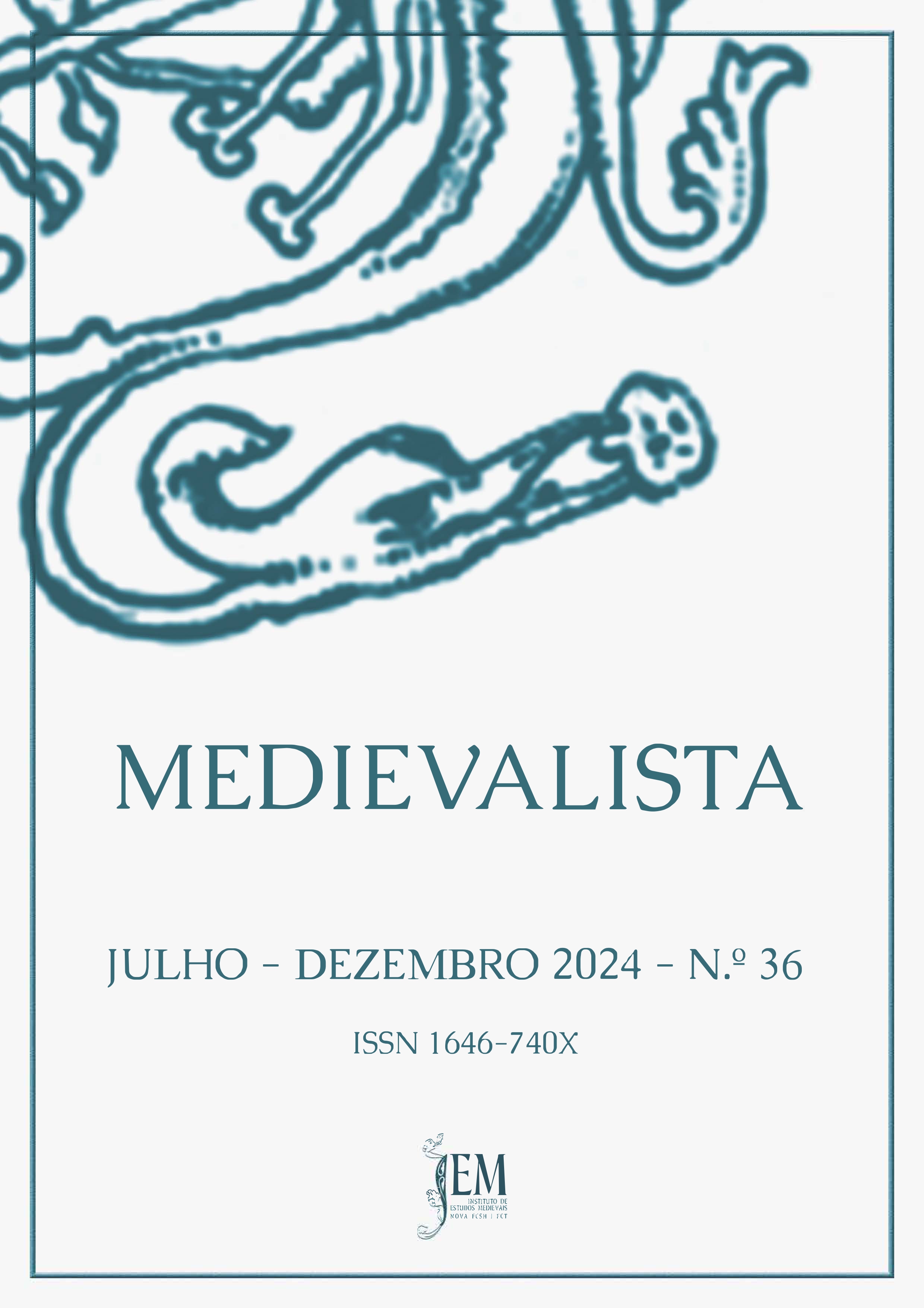
Medievalista 36 - Dossier "Diplomacy of the Crown Princes"
No. 36 (2024)In 2024, the Institute of Medieval Studies (IEM) celebrated twenty years of existence as a research unit. With some delay, it is true — it was in 2002 that the first FCT evaluation was presented —but perhaps inevitable when studying an era that had a different conception of time but which knew how to appreciate the value of rituals and ceremonies. As a rule, this was done. From the outset, the celebration was a commemoration, a community remembrance of the founders of the Institute and their heritage, accompanied by the evocation of the IEM's journey and the achievements and successes it had achieved in that period. Everything was remembered on the Institute's renewed portal (https://iem.fcsh.unl.pt/20-anos-iem/), using photographs, posters, and testimonies from researchers from other units and institutions, within and outside the country.
-
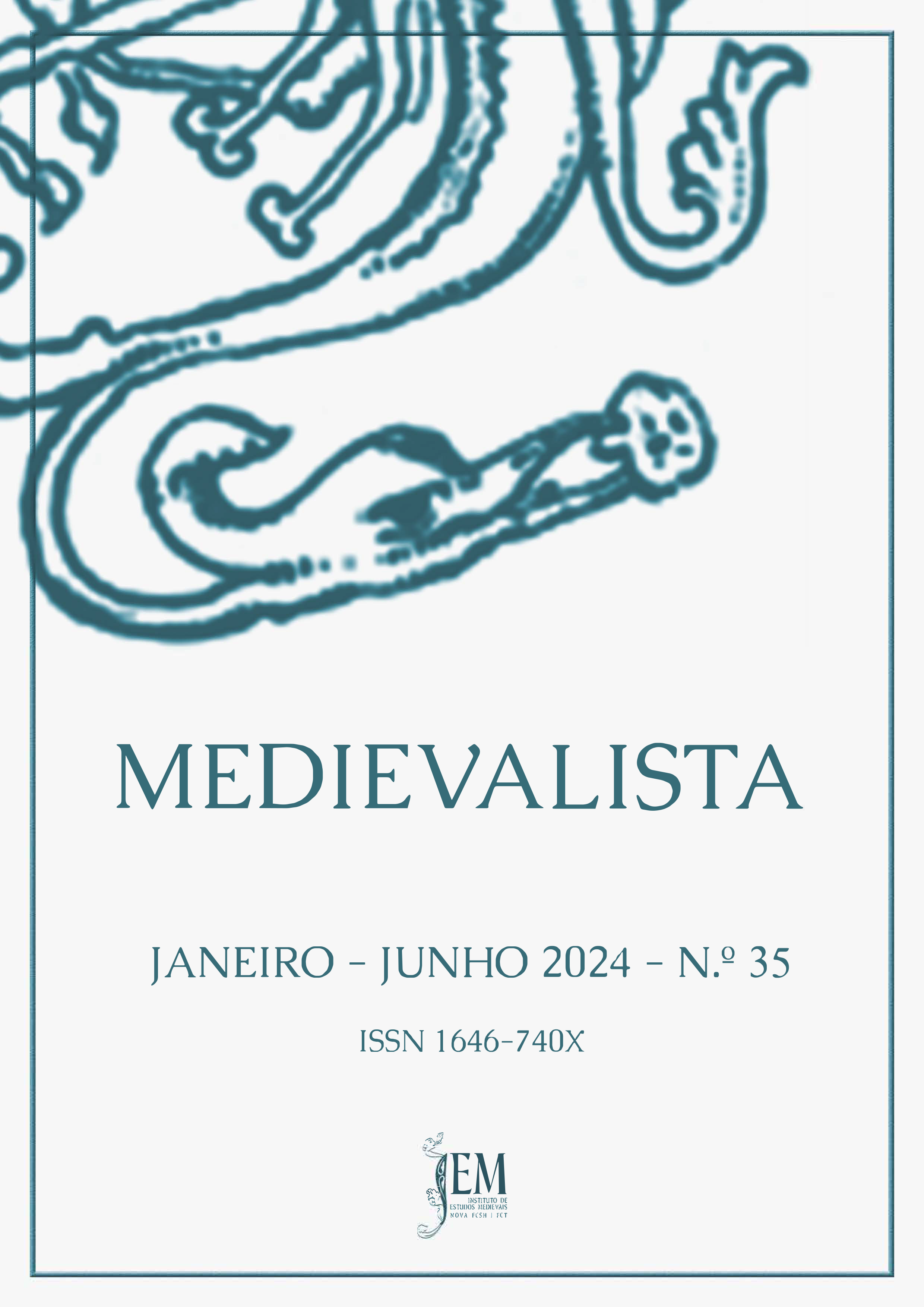
Medievalista 35
No. 35 (2024)Viva a Medievalista! Nem mais, nem menos. Foi assim mesmo, com estas palavras, que o Professor José Mattoso terminou, em Novembro de 2022, uma mensagem que dirigiu à Redacção da revista. Felicitava-a então pela qualidade do nº 32, o último publicado em Julho desse ano, e pelos contributos que a revista do IEM trazia para a renovação da investigação sobre a época medieval. Não era isto uma novidade – em anos anteriores, já fizera comentários elogiosos sobre o rumo da revista e do instituto —, mas era por certo a primeira vez que se manifestava com tal entusiasmo, atitude mais rara em quem cultivava a contenção dos gestos e a moderação. Havia talvez boas razões para tanto, das mais recentes às mais antigas.
-
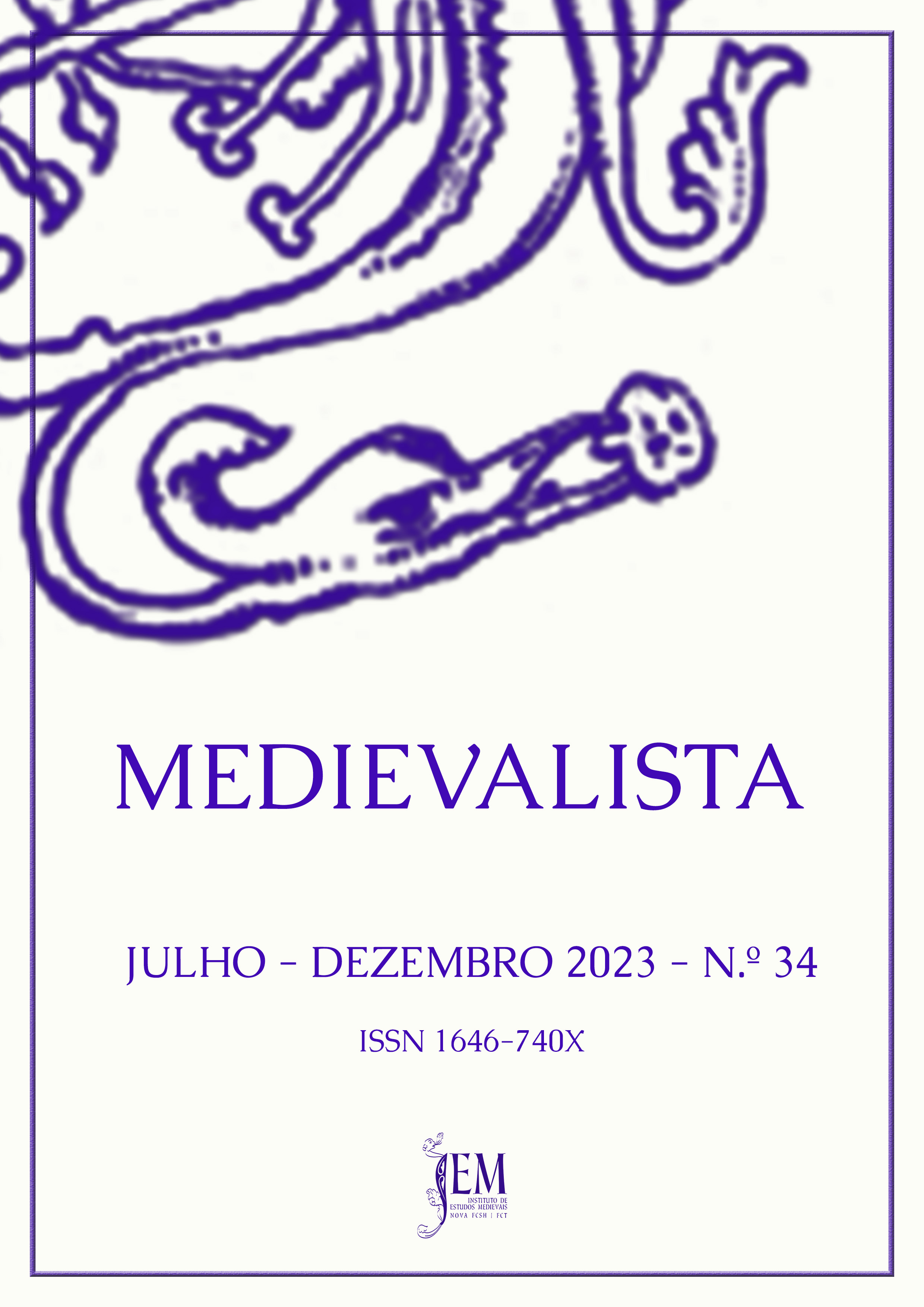
Medievalista 34 - Dossier "Medieval Chronicles"
No. 34 (2023)Vem a lume um novo número da Medievalista, numa data em que, encerrado o ano lectivo, se começam a fazer planos para um tempo de descanso, de encontros e de maiores demoras na fruição das coisas e, para muitos, na visitação de livros, ensaios ou mesmo textos mais breves que ficaram em lista de espera por causa das urgências da vida académica e profissional. São por vezes textos mais antigos, familiares, que agora se revisitam, como num diálogo com autores, personagens e lugares, que de algum modo se tornaram próximos, quase fazendo parte de quem os leu.
Em certa medida, é também esta a aproximação que se propõe em muitos dos artigos reunidos neste número, aplicada a textos e autores de geografias e de cronologias diversas, que procuraram construir uma determinada memória do passado, uma narrativa dos acontecimentos tornados mais significativos pela situação vivida por quem os organizou e redigiu, ou pelas instituições em que estes se inseriam. Longe da ingenuidade positivista que neles procurava sobretudo a identificação dos factos que, depois de situados no tempo e numa sequência de causa-efeito, permitiam uma reconstituição objectiva do passado, do que efectivamente se passou, a investigação actual, aprofundando os diálogos com outras disciplinas, da literatura e da filologia aos estudos culturais, veio mostrar a complexidade desses processos de construção da memória do passado. Em particular, a necessidade de os ler e interpretar à luz dos respectivos contextos de produção, das agendas de cada autor, mas também das múltiplas intertextualidades a que muitas vezes apelam, ou nas quais se suportam e se legitimam. Como se esta arqueologia dos textos não dispensasse a recuperação da história destes, nem dos autores por detrás deles…
-

Medievalista 33 - Dossier “O Castelo de Belvoir e a arquitectura fortificada da Ordem militar de São João”
No. 33 (2023)This Medievalista remembers Ana Cristina Lemos, another young researcher from the Institute for Medieval Studies who died prematurely. A specialist in the study of illuminations and a pioneer in research on color, she was responsible for the analysis of the Livro de Horas de D. Duarte, and, above all, for the discovery and appreciation of the collection of the Livros de Horas of Palácio de Mafra. As the texts published below, which pay a last and moving tribute to her, remind us, Ana Lemos was more than a competent researcher. She was not only a teacher attentive to the integral formation of her students, but also a committed citizen, with a life of militancy for civic, artistic, and cultural causes. In her own way, she did justice to the old lesson of Marc Bloch, who advised historian apprentices to live the life of their time in order to understand and decipher the remains of the lives of the past. Both for making history and for making it happen every day, it was almost inevitable that Ana Lemos would leave a vivid impression on the lives and memories of her colleagues, friends, and teachers. As do the colors she loved so much.
-

Medievalista 32
No. 32 (2022)Medievalista has long sought to establish itself as a journal of reference in the field of medieval studies. With the regular publication of two issues per year, always free of charge and without any costs for authors and readers, it is invested in the creation of an international platform for the dissemination, share and debate of ideas and perspectives. Through the publication of innovative studies, it aims to cross different disciplinary areas and transpose the most diverse historiographical traditions in order to bring together the distinct geographies of study and research in medieval studies. This has been Medievalista's vocation in recent years, in a drive to revitalize the frontiers of knowledge and disciplines in the best way possible, an aspect that is, by the way, a common heritage of the Institute of Medieval Studies.
-

Medievalista 31 - Dossier "Peninsular Exchanges"
No. 31 (2022)This issue of Medievalista features an interesting essay on the Contemplative History of José Mattoso. It also includes a very significant number of texts, initiatives and ongoing research of different types and origins, each of them a testimony of the different ways of making and communicating science in the field of Medieval Studies. With them, the journal keeps on consolidating its presence as a space for diffusion, debate and sharing of knowledge, doubts and questions, in an open access platform, free of any charges for either readers or researchers. As always have been done at Medievalista and will always be done in the future.
-

Medievalista 30 - Dossier "From the East to the West: The Military Orders"
No. 30 (2021)This edition opens with yet another note of regret, motivated by the disappearance of three illustrious researchers: José Marques, Filomena Barros and Helena Avelar: three names who leave a very significant legacy in several fields, from the history of the Church and ecclesiastical institutions to ethnic-religious minorities and the complex study of their relations with the Christian majority, or even astrology and its important role in the framework of medieval worldview and scientific knowledge.The body of this issue is formed by a thematic dossier, coordinated by Luís Filipe Oliveira and Gregory Leighton, on the world of military orders. The remaining articles, reviews, thesis presentations and news items show and extend the diversity and plurality of themes and perspectives, as well as attest to the vitality and resilience of medieval studies in times of pandemic.
-
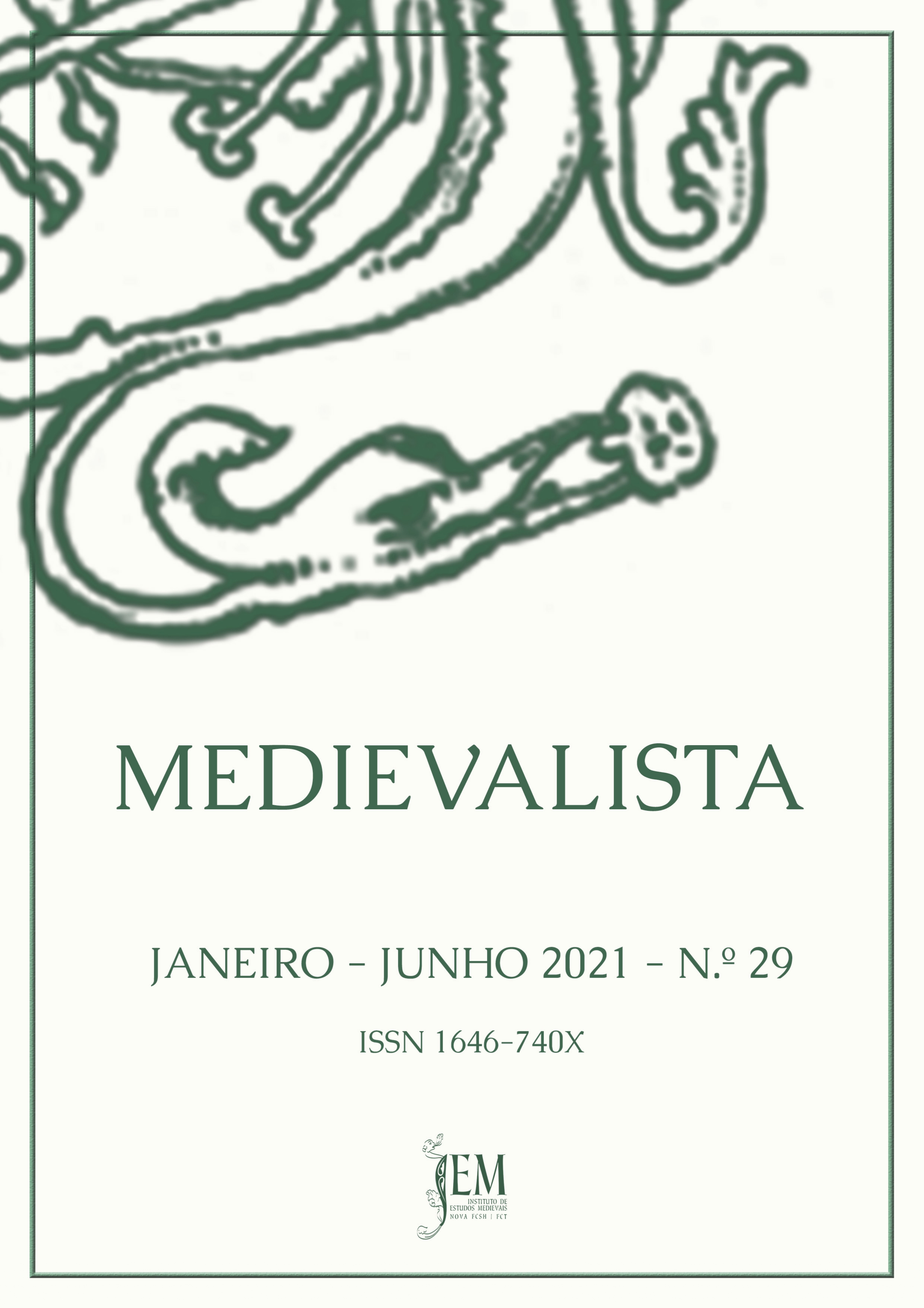
Medievalista 29 - Dossier "The Medieval Bestiary"
No. 29 (2021)This issue opens with a note of regret, as Peter Linehan passed away on July 9, 2020. The body of this issue is formed by a monograph on the Medieval Bestiary, coordinated by Adelaide Miranda and Pedro Chambel. Some of the texts are written by renowned authors, but many others belong to younger researchers, from different countries and other historiographies. The fixed sections of the review share the same diversity of origins, themes and perspectives. Through them, we try to set forth the resilience and creativity of the medieval studies in pandemic times, as well as the possibility of converting the current difficulties into an opportunity for greater sharing and debate.
-

Medievalista 28
No. 28 (2020)This issue of Medievalista brings some news. The most decisive ones were the simplification of its title - Medievalista on-line became Medievalista -, the adoption of a new management and editing platform and another renewal of the graphics in which the journal presents itself. Without abandoning the legacy of the past, particularly the openness to researchers from other languages and historiographies, the current issue integrates again a thematic dossier on the role of ecclesiastics in the construction of medieval monarchies. It also has three other articles on different topics from authors outside the peninsula, in addition to the usual headings, such as news, reviews and presentations, with the aim of a more comprehensive and systematic character, which will be done from now on.
-
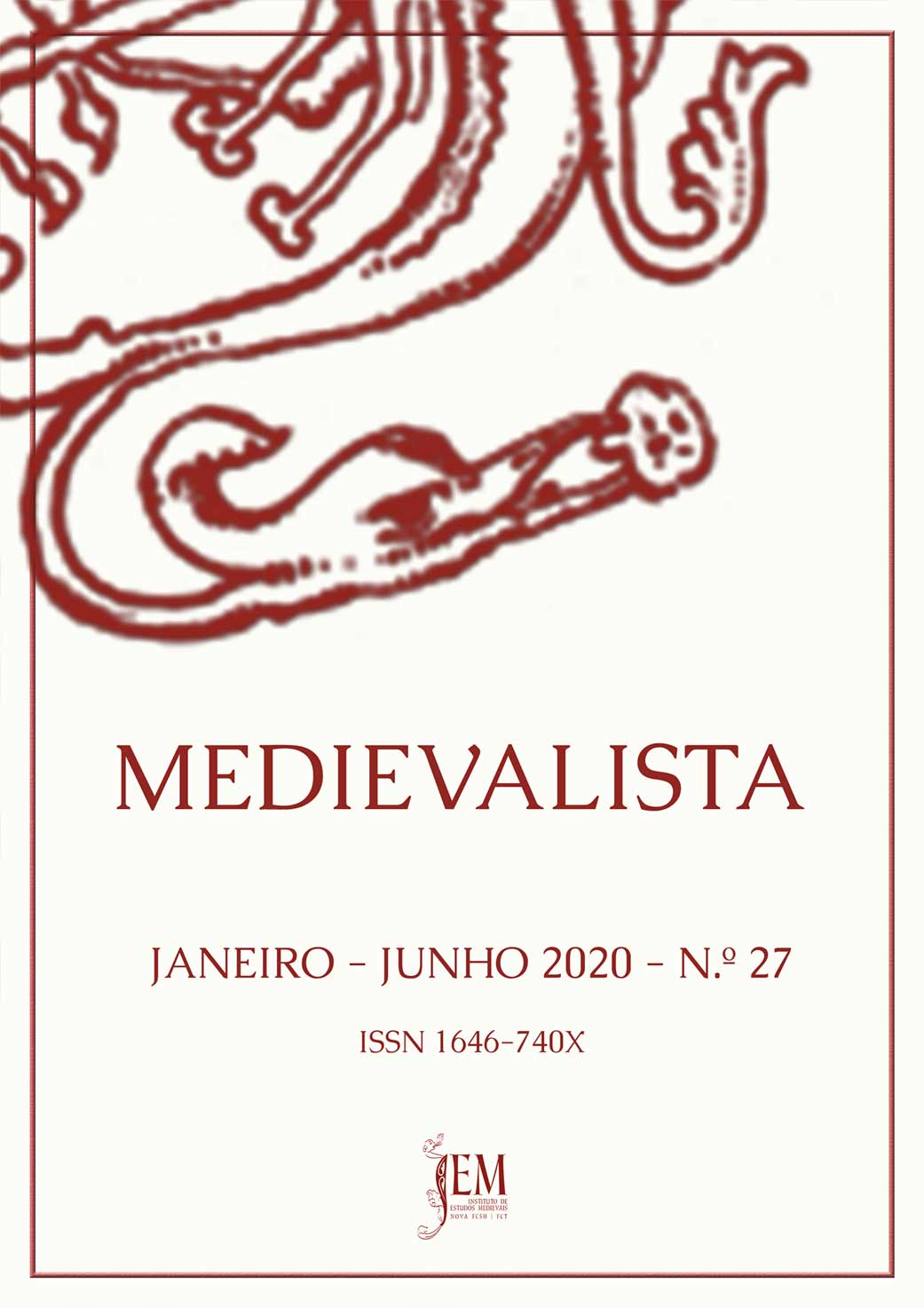
Medievalista 27
No. 27 (2020)In the previous issue of Medievalista, published on the 1st of July 2019, we have mentioned in the Editorial that the announcement of the results of the evaluation process of the Portuguese Research Units by the Foundation for Science and Technology (FCT) would soon be published. For what concerns the Institute of Medieval Studies (IEM), the work carried out during 2014-2017 and the Strategic Project proposed for 2019-2022 deserved the classification of "Excellent". This is a result that honours the IEM, its Direction, and all those who develop research in it. Their joint efforts and the quality of their initiatives and research are thus recognised. However, this is also a factor of increased responsibility for our Institute, and for each and every one of its members. The increase in public funding due to the change from the previous classification ("Very good") to the one now assigned, despite not allowing for extravagances, will enable some relief from past constraints, both in fundamental research and, for example, in the functioning of our journal.
-

Medievalista 26 - Dossier "Medieval Europe in Motion. The Middle Ages: a Global Context”
No. 26 (2019)This issue's thematic dossier is a direct outcome of the conference "Medieval Europe in Motion. The Middle Ages: a Global Context". Its organizers endeavored to bring together scholars to debate on one of the lines of IEM’s strategic project: "People and Knowledge in Motion: Medieval Portugal in Trans-European Networks". The aim was to discuss and reassess research related to mobility, circulation of models, and global phenomena in the Middle Ages, such as the polychrome Romanesque wood carvings in Europe. The articles included in this issue of the journal reflect the concern of researchers with the study of these sculptures, drawing attention to the importance of polychromy in works that appear to us today as a pale image of their original reality.
DOI: https://doi.org/10.4000/medievalista.2271
-
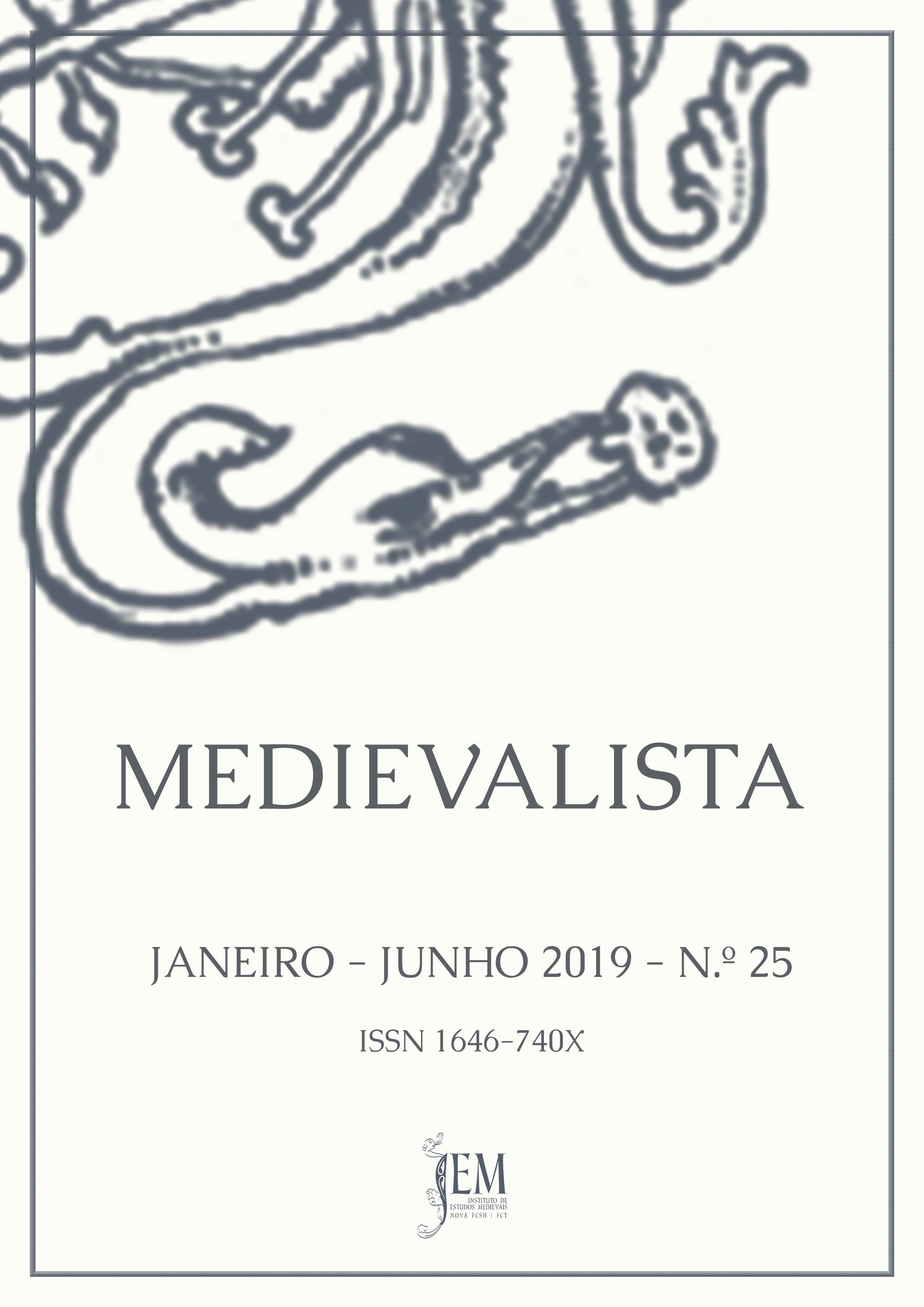
Medievalista 25
No. 25 (2019)A presente edição conta com um importante Destaque: o estudo de Iria Gonçalves sobre “A Cozinha e a Mesa em Loulé Medieval nos seus Utensílios de Uso Comum: o Testemunho dos Inventários de Órfãos”. Outros Artigos apresentam-nos trabalhos de William Trouvé sobre “El itinerário de una lista: de la Hispania visigoda a Italia beneventana, del Liber Iudiciorum al Pseudo-Isidoro”, de Ana Luísa Sonsino um estudo sobre “Os Leitores do Espelho de Cristina: um Recorte das Cortes”, de Lídia Amor um texto intitulado “Delectare ed prodesse: aventuras, placeres y didactismo en el Conte du Papegau” e de Mário Farelo o artigo “Roland Scriptoris ou de Lisbonne: un médecin, un professeur et un clerc portugais au XVe siècle”. As restantes secções incluem temas igualmente variados.
-
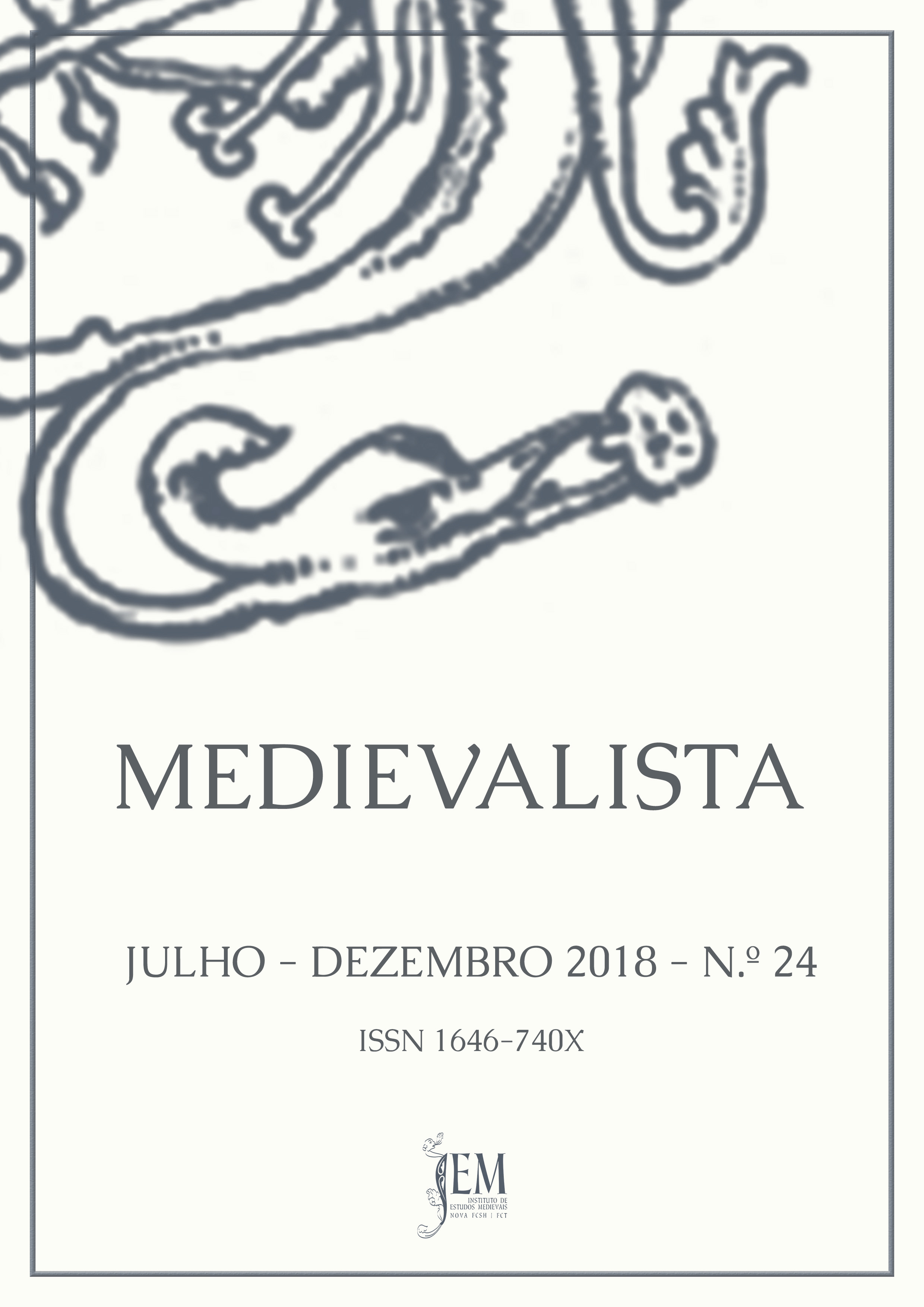
Medievalista 24
No. 24 (2018)Fiel ao compromisso da regularidade de publicação, este número 24 da Medievalista OnLine reafirma igualmente uma assumida opção pela diversidade, tanto nas temáticas dos artigos como na orientação historiográfica dos respectivos autores. Na vasta amplidão dos estudos medievais, a revista acolhe tanto os trabalhos de historiadores consagrados como os contributos de jovens investigadores. O único critério que procuramos adoptar é o da qualidade e interesse dos artigos. Além da orientação editorial que temos seguido desde o início da revista, a avaliação externa das propostas de publicação que nos chegam, avaliação essa feita por “árbitros” especializados e segundo critérios internacionais, visa alcançar o máximo de objectividade possível e uma suplementar garantia da qualidade dos textos divulgados.
-
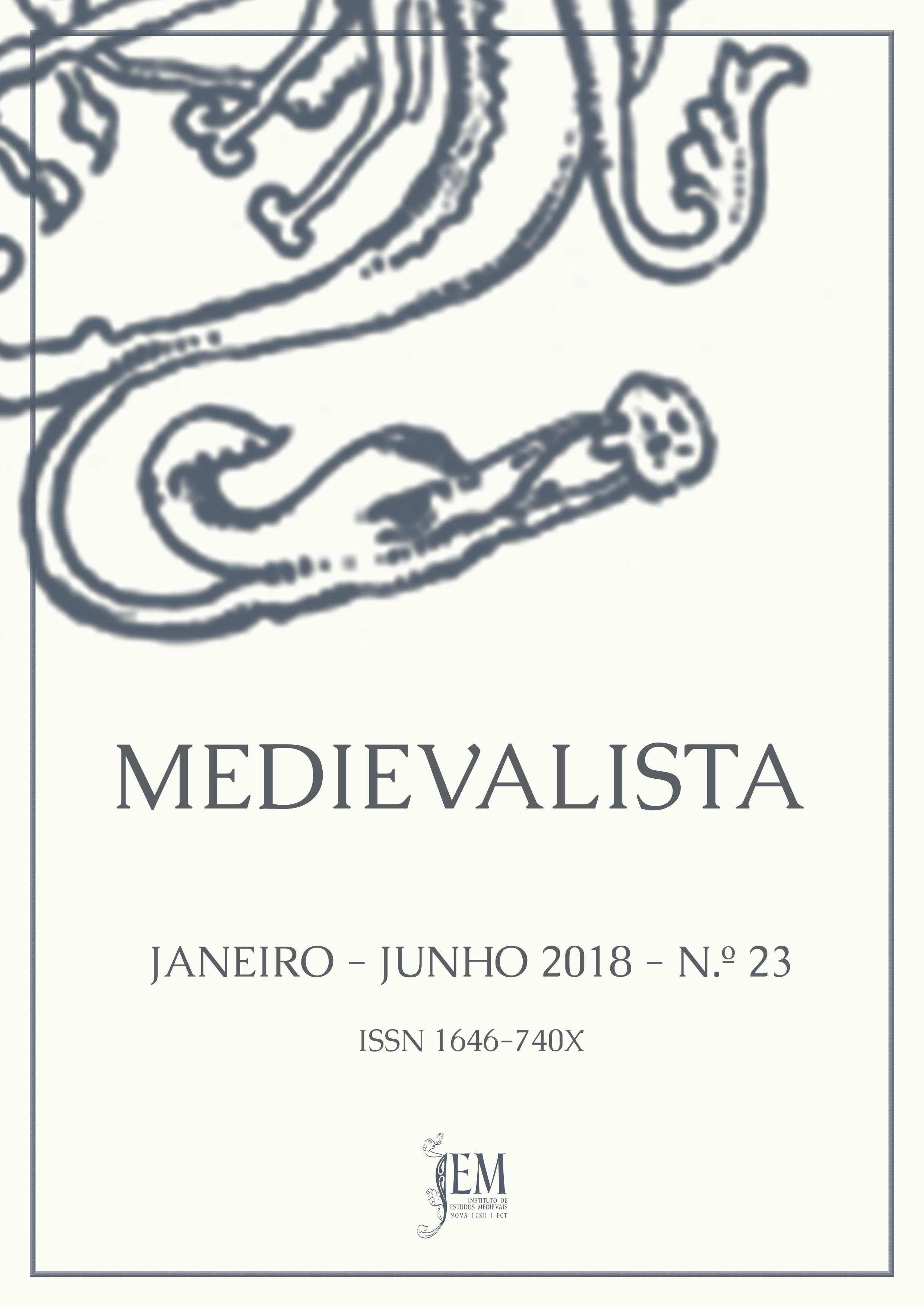
Medievalista 23 - Dossier "Debuerit habere regnum. Legitimacy in Medieval Monarchies"
No. 23 (2018)Este número da Medievalista é uma edição especial. Não porque quebre a absoluta regularidade de publicação da revista nem porque se tenha alterado o figurino a que habituou quem nela publica ou quem a consulta. Fiel às nossas exigências também neste campo, o número é disponibilizado na data normal, no início do semestre a que respeita. Mas especial porque, embora discutido e pensado várias vezes, nunca antes fora possível preparar e oferecer um verdadeiro dossier temático. Graças ao trabalho e à colaboração dos organizadores do colóquio “Debuerit habere regnum. Depor e proclamar reis na Idade Média”, que teve lugar na Faculdade de Letras de Lisboa entre 12 e 14 de Outubro de 2016, e à disponibilidade de um vasto conjunto de autores, são aqui divulgados vários dos trabalhos aí apresentados, depois de submetidos ao processo de avaliação por pares.
-

Medievalista 22
No. 22 (2017)Publicação aberta tanto a autores consagrados como a jovens investigadores, nem sempre é fácil à Medievalista alcançar um equilíbrio entre uns e outros que vá ao encontro do que é requerido pelos estudiosos da Idade Média que acedem à nossa revista. Os múltiplos afazeres dos investigadores mais antigos e as ingentes necessidades curriculares dos mais novos fazem com que surjam, naturalmente, mais propostas dos segundos do que dos primeiros. Mas a importância da lição dos Mestres nunca deixou de estar bem presente naqueles que fazem a nossa revista. Daí o gosto que sentimos pela publicação neste número do artigo de Iria Gonçalves intitulado “Para o estudo de um direito senhorial nas terras medievais de Alcobaça: o montado dos porcos”; e daí também a sua incontestável apresentação como Destaque.
-
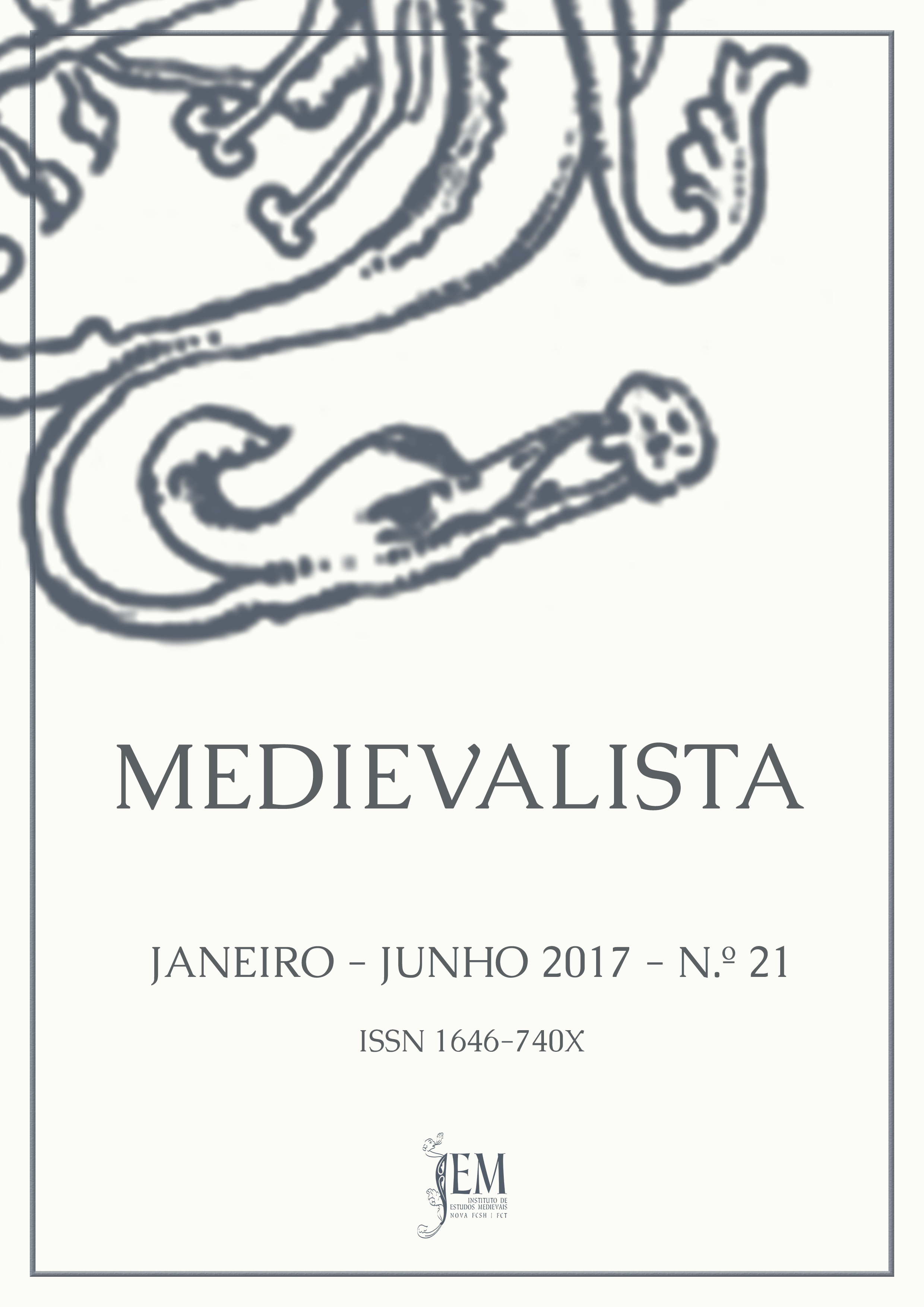
Medievalista 21
No. 21 (2017)O presente número da Medievalista dá continuidade à orientação que desde o seu nascimento tem sido seguida, acolhendo trabalhos de temáticas diversificadas, de autores com posições historiográficas distintas e oriundos de países, tradições linguísticas e inserções institucionais muito variadas. Este pluralismo, que constitui uma marca da nossa revista, tem sido fundamental para continuar a atrair leitores e, sobretudo, autores que submetem artigos seus para publicação. Procurando contrariar uma forte endogamia que costuma estar associada entre nós a publicações periódicas de carácter historiográfico, a grande maioria dos investigadores que se propõem publicar na Medievalista não integra o Instituto de Estudos Medievais, mas reconhece-o como entidade credível para a divulgação da sua investigação.
-
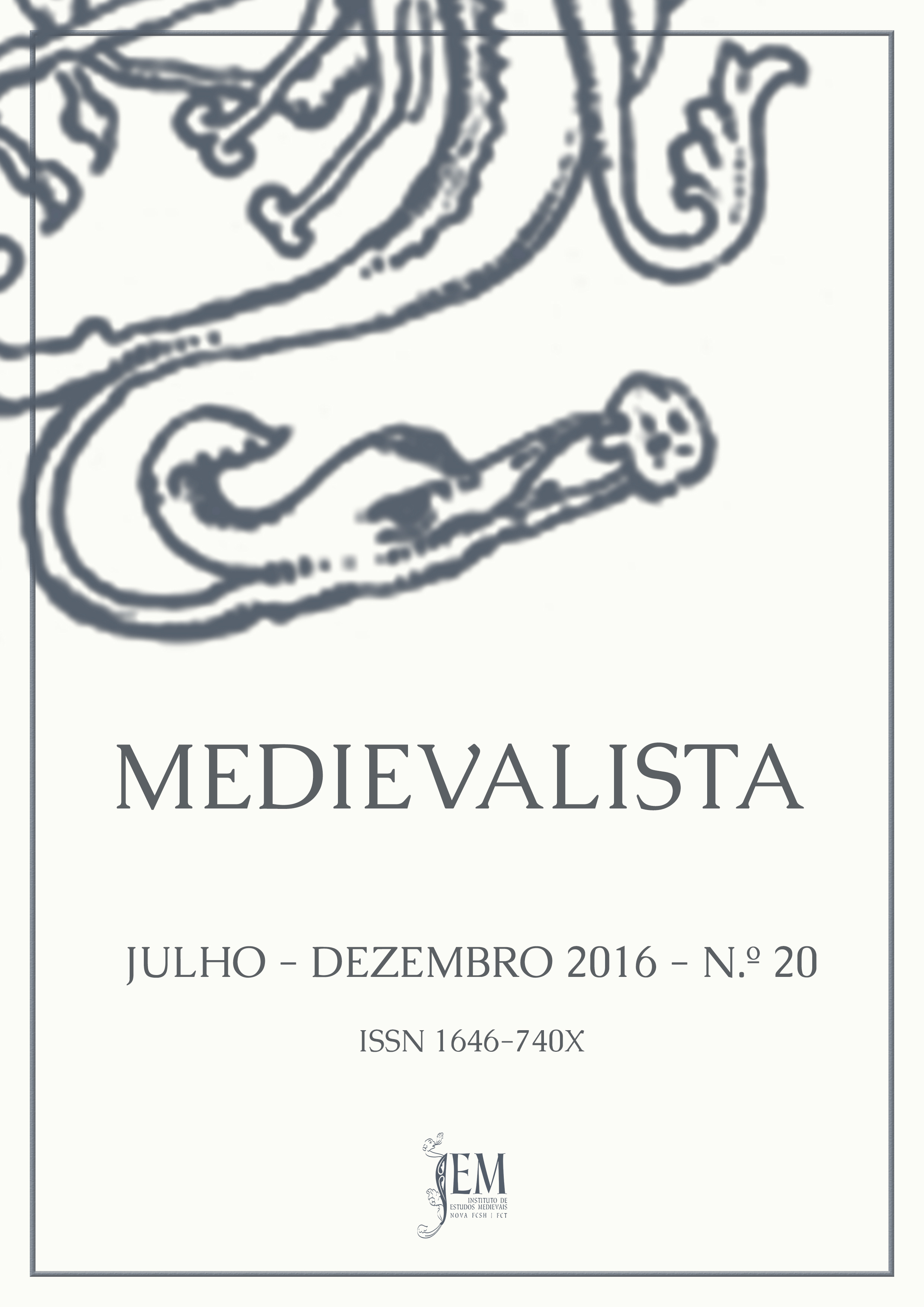
Medievalista 20
No. 20 (2016)Este número da Medievalista OnLine apresenta como “Destaque” a conferência de Arsenio Dacosta, intitulada "Geografías imperfectas: linaje y poder en la obra de Luís Krus", proferida no colóquio realizado em Lisboa em Outubro de 2015, na passagem dos 10 anos sobre a morte do fundador do Instituto de Estudos Medievais e primeiro Director da nossa revista. Segue-se um conjunto de cinco "Artigos" de temática variada, a habitual secção de "Recensões", a apresentação da tese de doutoramento de Joaquim Bastos Serra e, na secção "Varia", uma evocação do medievalista francês Jean Favier, da autoria de Armando Luís de Carvalho Homem.
-
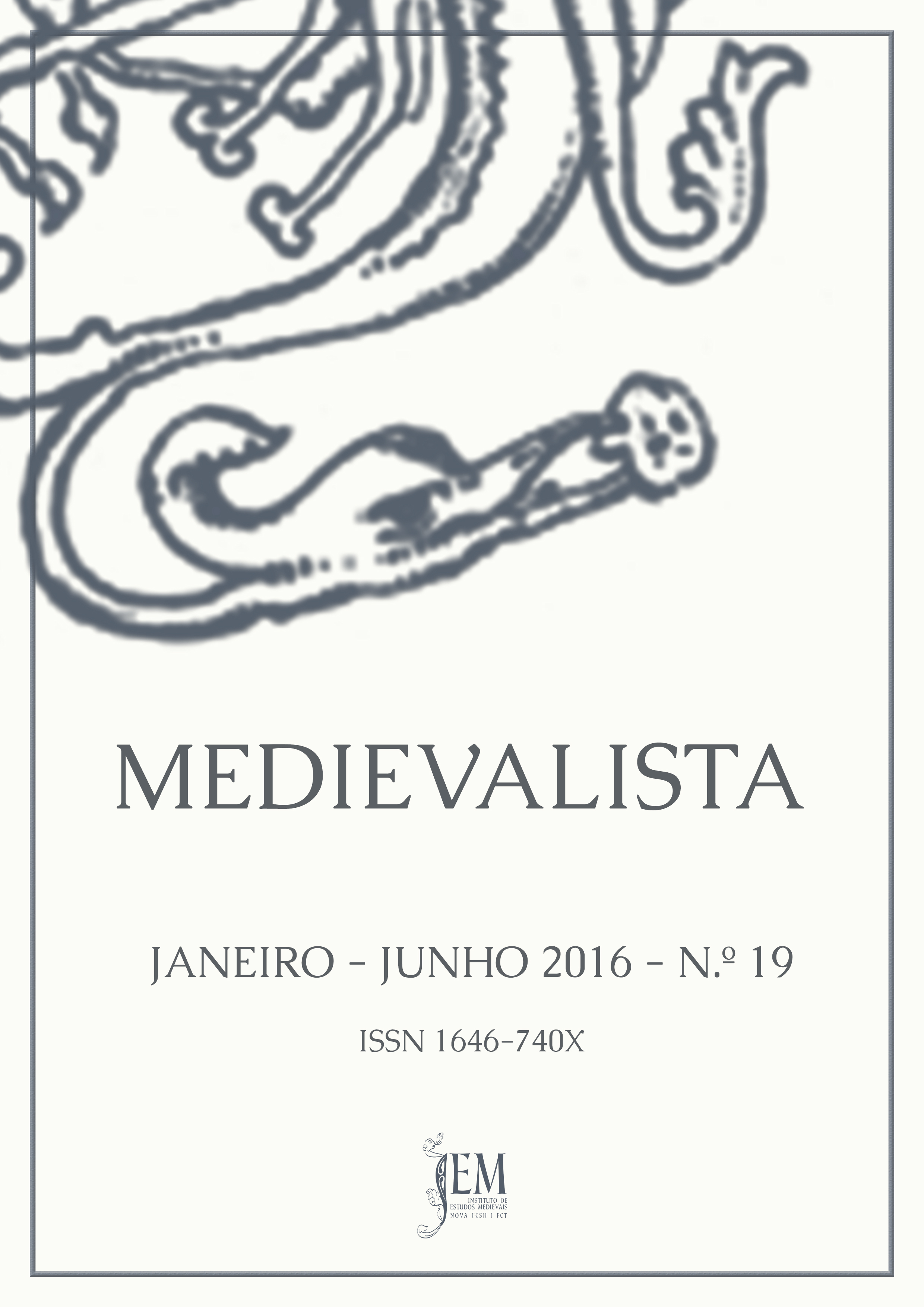
Medievalista 19
No. 19 (2016)Em 2015 a Medievalista completou dez anos de publicação regular, desde 2008 com uma periodicidade semestral. Mais do que celebrar o aniversário, a equipa redactorial quis reflectir sobre o caminho percorrido desde que, por iniciativa e sob a direcção de Luís Krus, a revista foi lançada. Tal reflexão seria limitada caso se encerrasse sob si mesma: a Medievalista, embora especializada na área dos estudos medievais, enquadra-se no campo mais vasto das ciências sociais e das suas publicações periódicas. O Seminário Internacional sobre “As Revistas de Ciências Sociais e os seus Desafios”, apresentado neste número, juntou representantes de várias revistas, suscitou uma ampla troca de ideias e promoveu o levantamento de alguns dos mais relevantes problemas que se colocam na actualidade a este tipo de publicações.
-
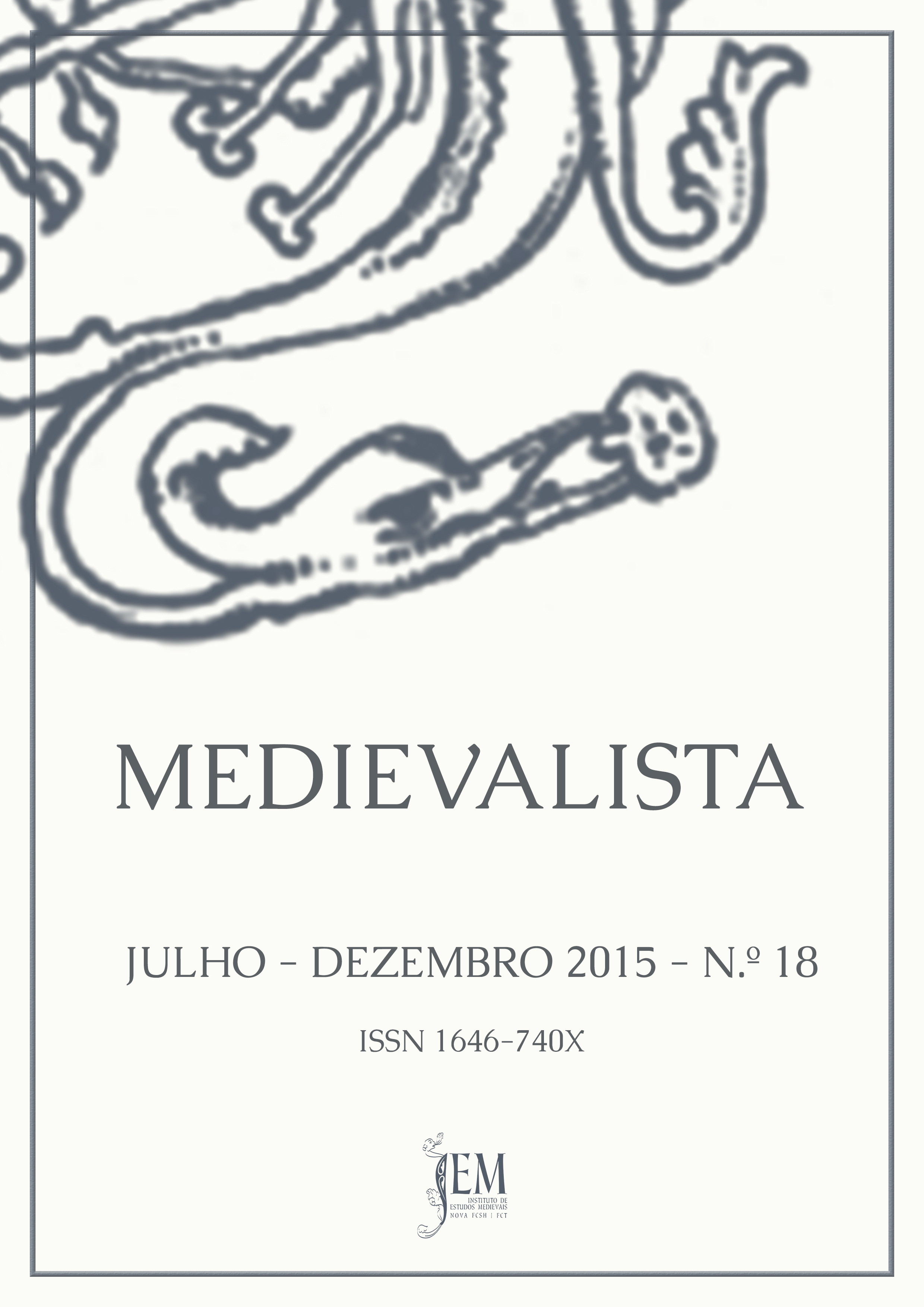
Medievalista 18
No. 18 (2015)A revista Medievalista OnLine, fundada em 2005 para dar cumprimento a um projecto vivamente acalentado pelo saudoso Prof. Luís Krus, conta já com dezoito números e dez anos de existência, muitas dezenas de artigos originais, algumas recensões críticas (não tantas quanto seria de desejar), muitas informações variadas de carácter historiográfico, textos de homenagem a reputados medievalistas portugueses e estrangeiros (alguns necrológios), notícias de colóquios e encontros científicos, etc., etc.. Ao lado de textos de historiadores com nome feito nos meios académicos nacionais e internacionais, aparecem também artigos e contribuições de jovens investigadores que ousam abrir o conhecimento da História explorando temas novos ou revisitando problemas antigos.
-
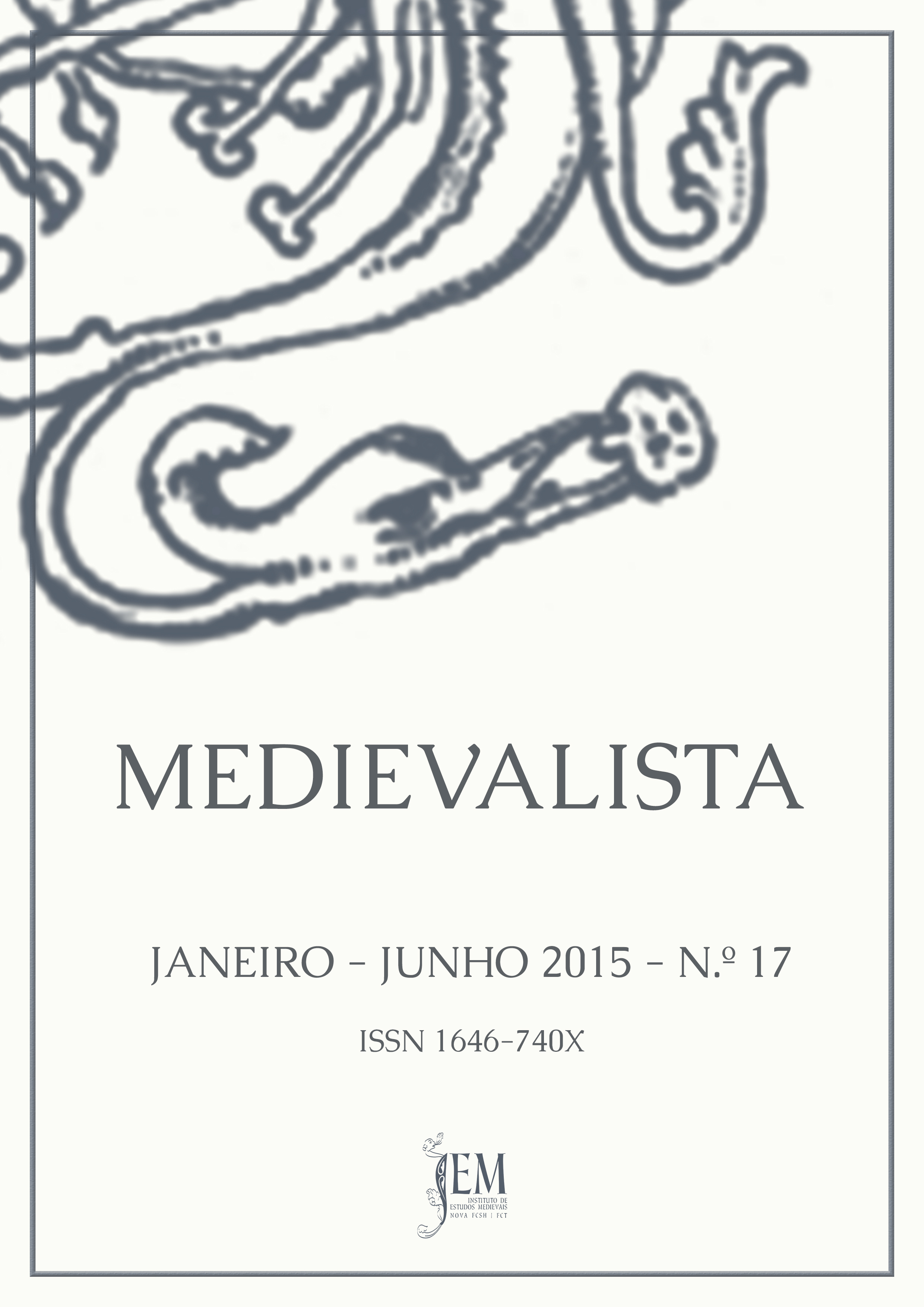
Medievalista 17
No. 17 (2015)Cumpre-se este ano uma década de publicação da Medievalista. Semestral desde 2008, mantém desde então, uma regularidade pouco habitual no panorama das publicações científicas nacionais. Sem triunfalismos, mas também sem falsas modéstias, cremos haver razão para celebrar estes dez anos. Este número marca também o início de um par de iniciativas com esse propósito. O Destaque, da autoria de Maria Adelaide Miranda e de Pedro Chambel, evoca os tempos de lançamento da revista, sob a iniciativa e o entusiasmo do seu fundador e primeiro director, Luís Krus. Ninguém melhor do que eles, os dois membros da Redacção que nela permanecem desde o início, para recordar o contexto, os limites e a ambição que envolveram a criação da Medievalista, bem como o caminho percorrido.
-
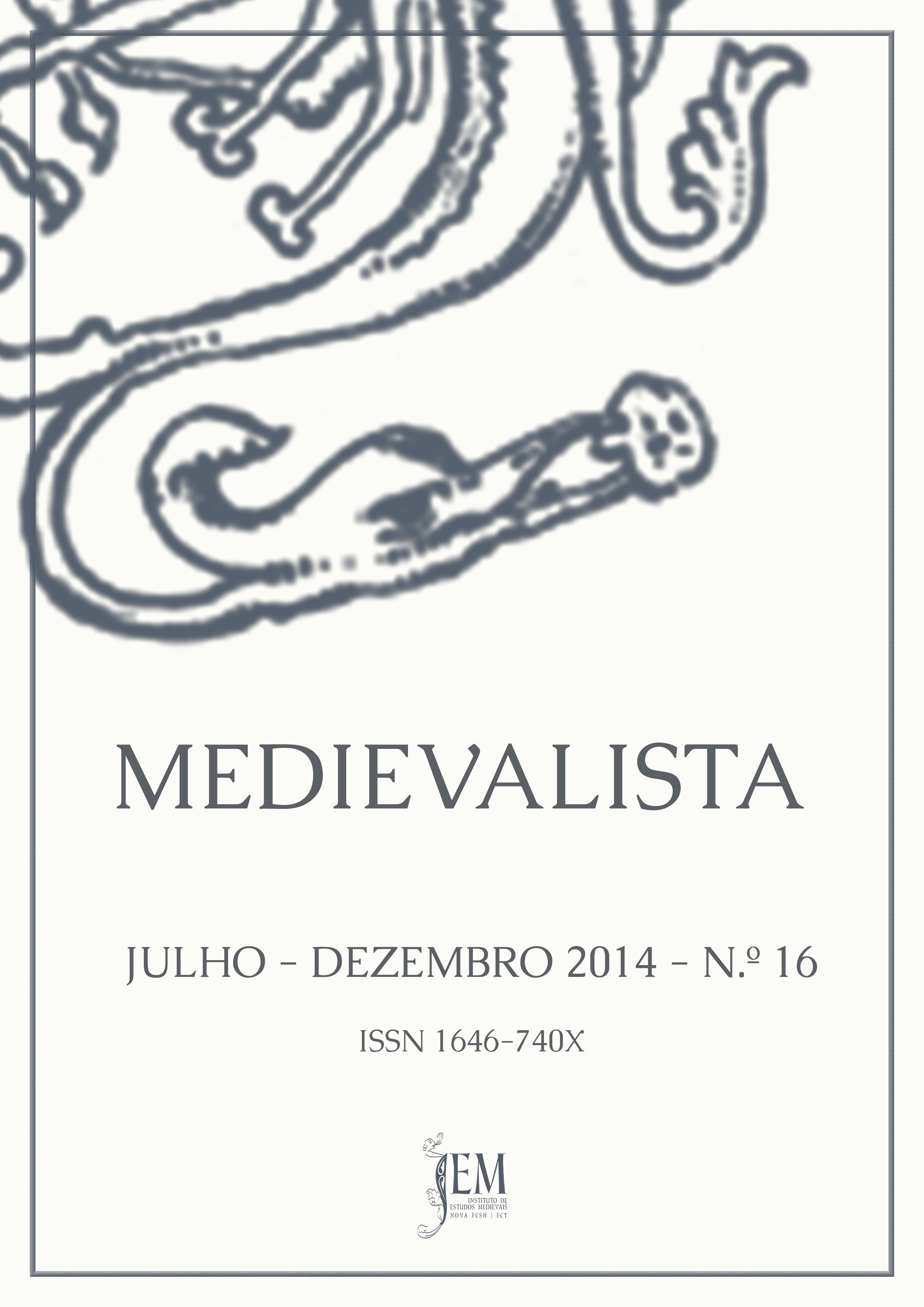
Medievalista 16
No. 16 (2014)Dando curso ao que vem sendo a prática da Medievalista Online, o presente número mantém o princípio de divulgar investigações o mais variadas possível quanto aos temas, aos géneros ou às regiões. Seguimos, assim, de certo modo, a largueza de vistas de Jacques Le Goff, o grande medievalista cujo falecimento assinalamos neste número através de um In Memoriam da autoria do nosso Director.
-
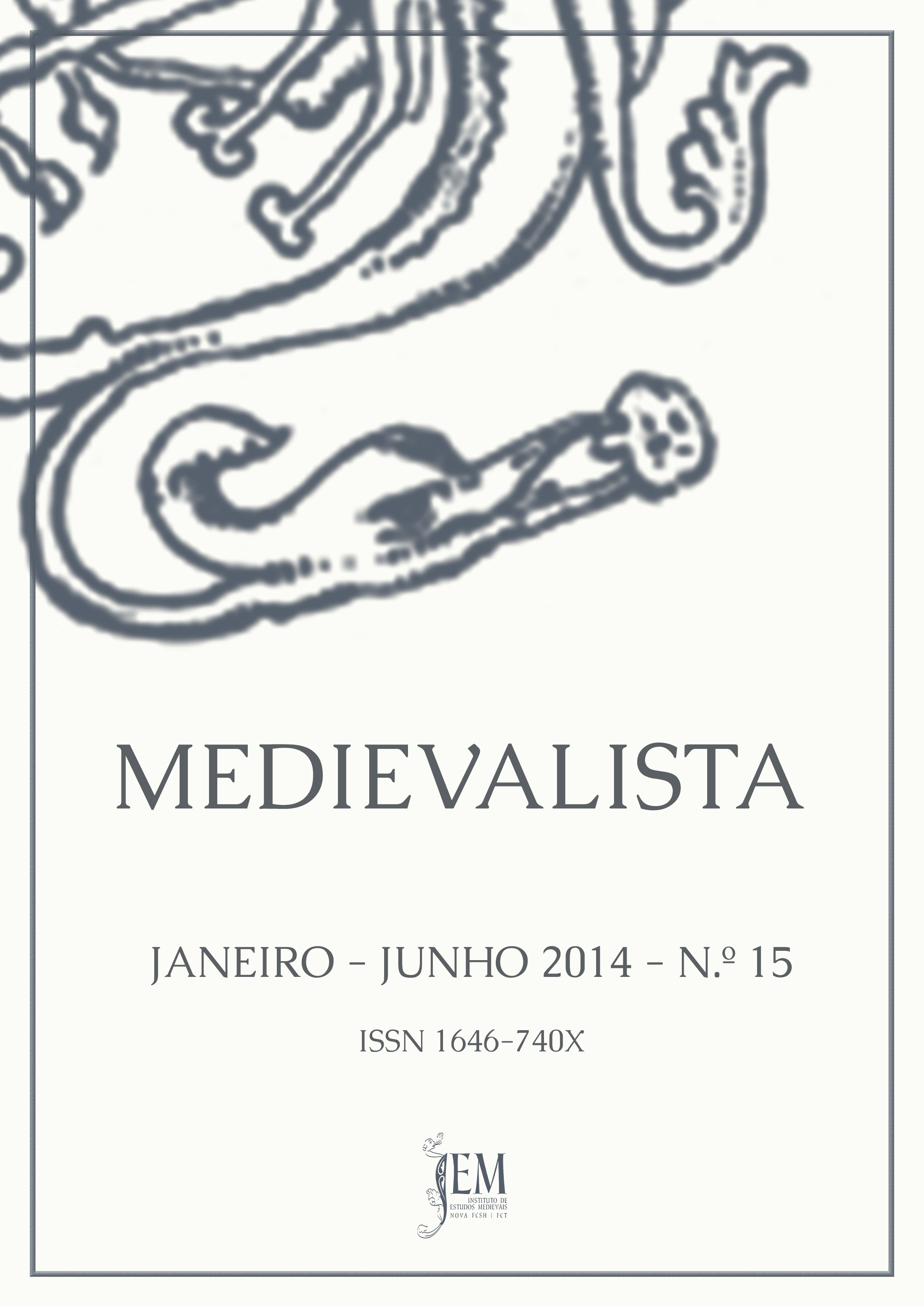
Medievalista 15
No. 15 (2014)O presente número da Medievalista inaugura uma nova fase na vida da revista. Depois de um longo período de preparação, preenchendo requisitos científicos e resolvendo exigências técnicas e administrativas com custos financeiros, a nossa revista passa a integrar as plataformas LusOpen, DOAJ e SciELO. É mais um pequeno passo no caminho que a Medievalista vem percorrendo, mas que queremos que seja um grande passo na difusão e divulgação dos estudos medievais, por parte de uma publicação periódica, de carácter científico, elaborada e produzida em Portugal.
-
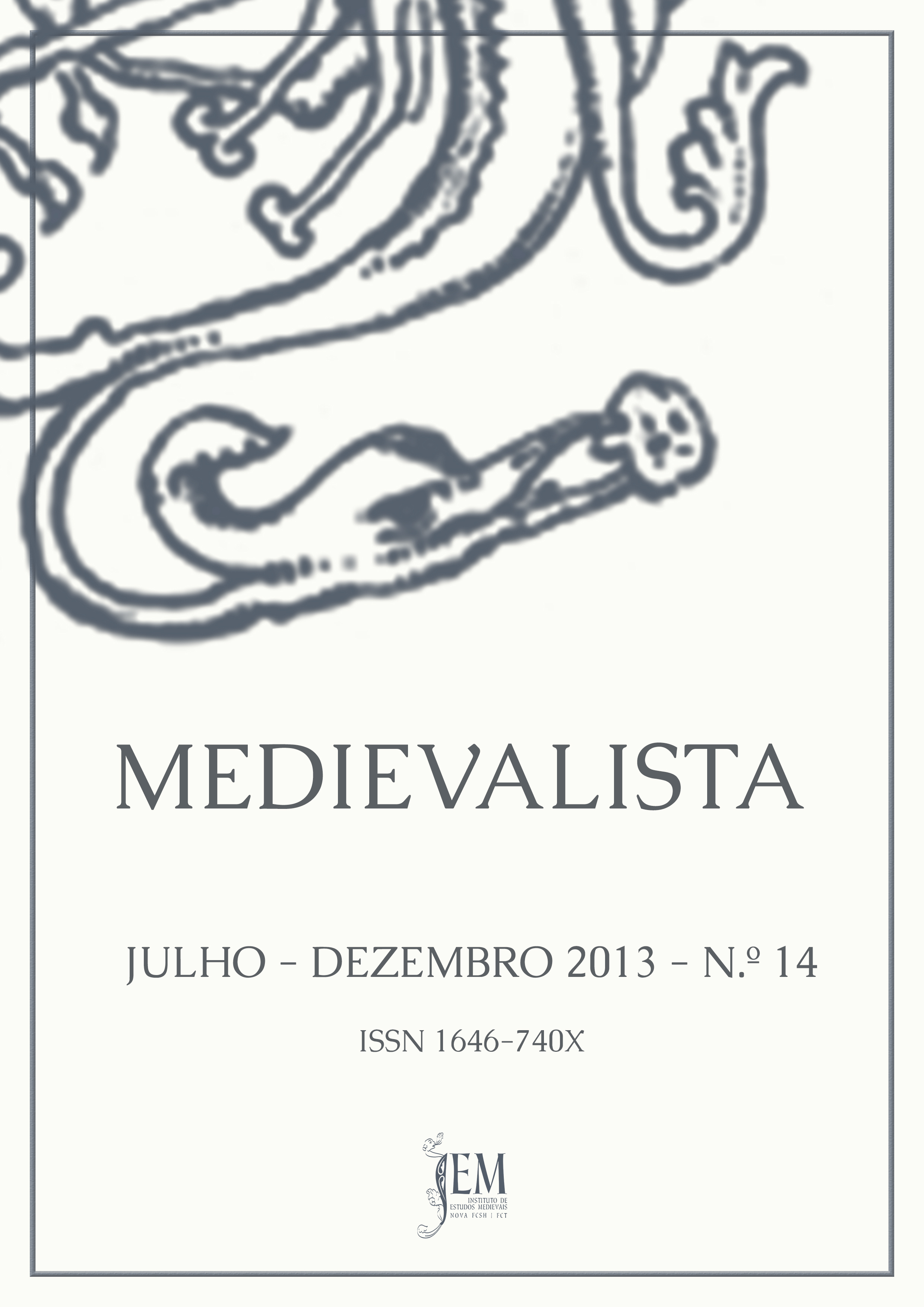
Medievalista 14
No. 14 (2013)O apelo à apresentação de artigos lançado pela Medievalista para os números 14 e 15 encontrou grande receptividade junto de estudiosos da Idade Média. De facto, chegou-nos um número muito significativo de trabalhos a submeter a arbitragem científica, com vista à sua publicação. Daí que, apesar de incluirmos agora um conjunto mais vasto de artigos do que é habitual, tenha ainda transitado para o próximo número um considerável leque de propostas recebidas pela Redacção.




















